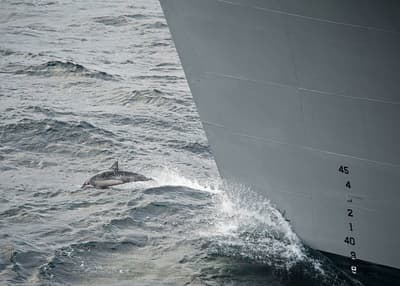A dolphin swims in front of the bow of U.S. military ship USNS Supply. U.S. Navy
The world’s oceans are getting noisier, humming with the near-constant sounds of ship engines, seafloor mining, and oil and gas exploration. Now, a new study published in the journal Biology Letters has found that dolphins are being forced to simplify their calls in order to be heard over the noise.
A team of researchers, led by marine biologists Helen Bailey and Leila Fouda from the University of Maryland Center for Environmental Science, analyzed some 200 recordings of bottlenose dolphin calls collected over a three-month period in the North Atlantic using underwater microphones. They found that in noisy parts of the ocean, dolphins communicated using less-complex, higher-frequency whistles than in quieter areas.
“It’s kind of like trying to answer a question in a noisy bar and after repeated attempts to be heard, you just give the shortest answer possible,” Bailey said. “Dolphins simplified their calls to counter the masking effects of vessel noise.”
Dolphins are highly social animals and use their calls to stay together as a group, talk as they feed, and call out their names when they meet new members of their species. Each animal has a distinctive whistle, which typically uses complex sound patterns with variations in pitch and frequency.
“These whistles are really important,” Bailey said. “Nobody wants to live in a noisy neighborhood. If you have these chronic noise levels, what does this mean to the population?”
For more on how ocean noise pollution wreaks havoc on marine life, click here.
